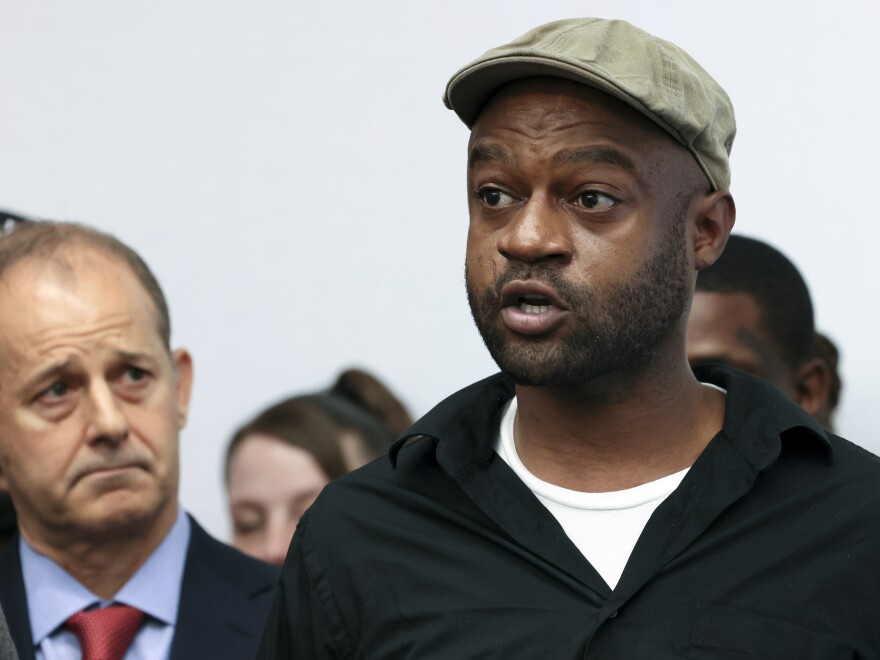Editor's Note: This story contains descriptions of sexual abuse allegations.
As a teenager almost 20 years ago, Jeffery Christian was sent to a juvenile detention center in southern Illinois. He says he expected to use his time there to grow and change, with the support of the staff around him.
"Instead I was sexually abused and neglected," Christian said at a recent press conference. "I learned at too young of an age that the system wasn't going to make me a better man, just hurt me."
Christian says he was abused by multiple staff over the course of several years, starting just a few days into his detention. According to a lawsuit filed last week in the Illinois Court of Claims, his mother reported at least some of the alleged abuse to leadership but no one followed up.
He is one of more than 90 people who sued the state last week, saying they were abused by employees when they were in juvenile detention, some as young as 12 years old.
It is the latest in a flurry of legal cases around the country claiming similar sexual misconduct by employees of facilities housing children charged with a crime. The U.S. Justice Department on Wednesday announced an investigation into Kentucky's youth detention facilities.
Since the start of the year, there have been lawsuits filed in at least four states, including the one in Illinois. In April, more than 150 people sued New York City. In February, 63 people sued Maryland, bringing the total there to at least 200 people who have sued since last fall. In January, 50 people sued New Jersey.
The men and women in the lawsuits allege very similar abuse across several decades. Some say they were raped. Others say they were forced to perform oral sex or were inappropriately touched by employees. Some say they were given rewards, like special snacks or extra recreational time, if they complied; others say they were punished for refusing, including being sent to segregation, a form of solitary confinement.
They say their abusers were the people who were supposed to be there to protect and rehabilitate them: Correctional officers, counselors, teachers and medical staff, among others.
When reached for comment, representatives for Illinois, New York City and Maryland all responded similarly, pointing out that the abuse allegations predate their administration, but that they take the safety of youth under their care seriously. A spokesperson in New Jersey did not respond to a request for comment.
The Illinois Department of Juvenile Justice told NPR it "takes seriously the safety of youth" in its care and that "all allegations of staff misconduct are immediately and thoroughly investigated."
Changes in state laws have paved the way for many of the new lawsuits.
Last year, for instance, Maryland removed the statute of limitations altogether on child sexual abuse cases.
In New York City, a 2022 amendment to a law there protecting against gender-motivated violence included what's known as a "look back window," which offers a period of time when victims can sue even if it's been many years since the alleged abuse took place. That window closes in March of 2025.
New Jersey changed its child victim law in 2019. Previously, lawsuits had to be filed before the victim turned 20 or two years after they first understood that they were harmed, whichever came later. Now, people can sue until age 55, or within seven years of their understanding of harm.
"What these laws recognize is that it often takes years or even decades for a person to be ready to come forward," says Jerome Block, an attorney representing the plaintiffs in several of the lawsuits. "These new laws are really giving them a chance to step forward, to seek justice, to seek accountability."
Block says to expect more lawsuits in other states making similar allegations. The nonprofit Child USA tracks child victim laws nationwide, and according to their research, more than a dozen states have changed laws in recent years to allow survivors more time to sue.
Experts say juvenile facilities are inherently dangerous places for children. According to the Sentencing Project, a research and advocacy group, recurring abuse has been documented in state-funded juvenile detention facilities in 29 states and the District of Columbia in recent decades.
"You're taking vulnerable kids and putting them with very powerful staff who have the ability to not only make their daily lives miserable or more comfortable, but also can affect their ability to get out of the facilities," says Michele Deitch, director of the Prison and Jail Innovation Lab at the University of Texas at Austin. "You've got to start by acknowledging that there are so many kids who should never be in these settings at all."
She says making sure facilities have high-quality leadership and staff, along with independent monitoring, is an important way to curb this kind of abuse. Several states, including Illinois, already have ombudsmen in place who monitor conditions in these facilities.
Copyright 2025 NPR



